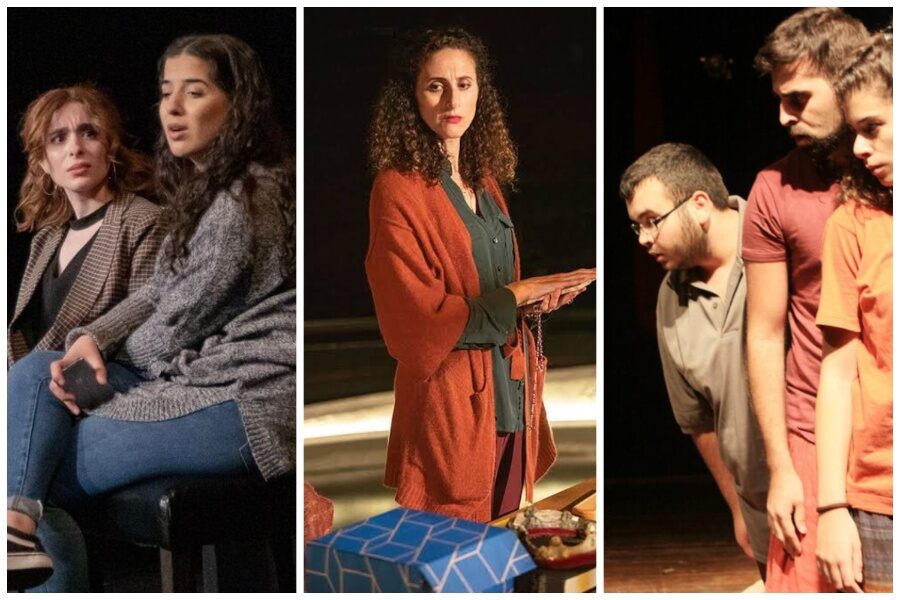“Art is the only bright spot right now—it’s the only place where people can share,” said Raymond Bobgan, executive artistic director of Cleveland Public Theatre, under whose aegis a project called Masrah Cleveland Al-Arabi has formed. The troupe recently performed a piece called The Outstretched Hand (يد الوصال). Jamal Boudiab, a Lebanese American performer in the company, shared that while rehearsals were emotionally taxing, making theatre has been “very healing,” as it “allows us to grieve, to be ourselves, to show our pain.”
“There’s no better time for us to share our stories than at this moment,” she added, referring to the ongoing war in the region, where daily civilian casualties have been extraordinarily high following the Hamas attack on Oct. 7 and the subsequent Israeli incursion into Gaza. As of this writing, a temporary ceasefire is in effect to facilitate hostage and prisoner releases and provide access for humanitarian aid to Gaza, but the conflict seems far from over.
American Theatre spoke with Middle East and North African (MENA)-identifying theatres about how, as art institutions and community spaces, they are responding to the war and to their local community’s needs. Many theatres have reworked current and upcoming productions to create virtual refuges for artists and viewers and to participate in the global conversation by highlighting underrepresented narratives.
“We’d already written essentially two-thirds of the play before October 7th, then we just felt like we can’t ignore this” Bobgan said of The Outstretched Hand. The play followed three separate stories, all interrupted by an unnamed disaster that dramatically altered their courses, much like the ongoing war. The company’s performers deeply “felt that [disruption]—we lived that in our own personal lives,” Boudiab explained, in reference to how many of the cast have been directly impacted by the war, and/or share other traumatic regional experiences, from the Beirut bomb blast to severe earthquakes, as well as generational trauma.
“There are some people in theatre that are like, ‘Leave your daily life self at the door,’” said Bobgan. “I’m so opposite of that. What can we bring from our daily life into the room that is going to propel our work?”
At Golden Thread Productions in the Bay Area, artistic director Sahar Assaf said bluntly, “We’re not okay. I’m not okay. I don’t think we’re even fully processing…There are days where I feel completely dysfunctional.” Assaf, who lived the first 18 years of her life under the Israeli occupation of Lebanon, admitted that “the artist in me is completely paralyzed,” and that she often questions the point of even creating art at this time.
On the other hand, Assaf said, “The value of theatre, in my opinion, is it’s the most peaceful form of protest. And we must use it as such…We need to speak about this. We need to be daring. We need to be bold. We need to narrate.”
In response to the war and in an effort to elevate Palestinian voices in the U.S., Golden Thread has dedicated its 2024 season to stories from or about Palestine, including a Women’s Day event that will bring a woman artist from Palestine.
Three weeks into the war, Golden Thread Productions and Art2Action co-produced the fourth MENA Theater Makers Alliance (MENATMA), which meets annually to discuss how to perform and tell stories about and from MENA communities on U.S. stages. Originally scheduled to open with a panel on theatres in the post-COVID era, the slate was rearranged to hold space to feature Palestinian artists and discuss the role of theatremakers during this time. Many theatres have released statements of solidarity condemning the loss of Israeli and Palestinian civilian lives, terrorism, collective punishment, and all forms of antisemitism and Islamophobia. Noor Theatre’s statement and Golden Thread Production’s resource list have been circulated throughout the community and referenced by other theatres.
Today, Nov. 29, the U.N. recognized International Day of Solidarity with the Palestinian People, the Ramallah-based ASHTAR Theatre is organizing a global reading of The Gaza Monologues. These testimonies were originally penned by ASHTAR youth in 2010—though, as Noor executive artistic director Ariana Sarfarazi said, “It’s as if you could have written it yesterday. It’s the same experience. It just really highlights the horror, hope, and resilience of Gazans.”
Noor is hosting a virtual evening of monologues, tonight at 7:30 p.m. ET, which will include a reading from the theatre’s co-founder, Lameece Issaq, and is also calling upon community members to record one of the 33 monologues to be posted on Noor’s website. In partnership with Aviva Arts, Golden Thread will be presenting the monologues in multiple languages in an online stream, 12-2 p.m. PT. This project is “giving us energy and giving us strength to keep going,” Assaf said.
Theatre allows artists to bring stories directly to audiences that can educate, engage, and create empathy. “You’re going to see different stories on social media and sometimes they’re contradicting,” said Masrah’s Boudaib, “what matters is to come in and see the human in every one of us.”
Mandy Taheri (she/her) is an arts and culture journalist in Brooklyn.


